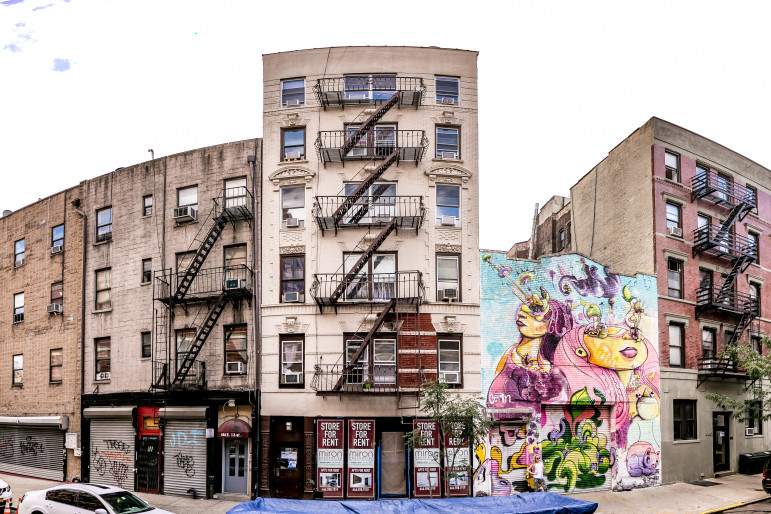“As tenants who have suffered under aggressive landlords funded by predatory lenders, we urge our lawmakers to support the creation of public banks, mission-driven to provide affordable financing to responsible buyers of multifamily dwellings.”

Adi Talwar
444 East 13th Street in the East Village, formerly owned by notorious landlord Rafi ToledanoSignature Bank’s sudden collapse has revealed what many of us in the housing justice movement already knew: The bank’s business model relied on speculative and often predatory practices in the name of maximizing profits.
As tenants who have suffered under aggressive landlords funded by predatory lenders, we urge our lawmakers to support the creation of public banks, mission-driven to provide affordable financing to responsible buyers of multifamily dwellings.
We have seen Signature’s speculative and predatory business model up close. In May 2015, Signature Bank and Madison Realty Capital (MRC) underwrote loans to Rafi Toledano who purchased a portfolio of buildings in the East Village and Chelsea. Like much of Signature’s problematic multifamily lending, the loans were structured in a way that promoted displacement of rent-regulated tenants and jacking up of rents to market-rate.
To protect ourselves from ensuing landlord harassment, we joined fellow tenants of his buildings to form the Toledano Tenants Coalition which has now become Tenants Taking Control (TTC). After investigating Signature’s lending practices, TTC met with the bank’s representatives to demand that Signature take steps to improve its policies. To date, we have found little evidence that Signature upheld the assurances it made to TTC at that meeting.
Meanwhile, TTC worked with Cooper Square Committee and Take Root Justice to document Toledano’s harassment and building violations and submitted evidence to the Attorney General of New York. When Toledano defaulted on his loans, a court ordered MRC to take control of his buildings and cure the violations. In 2019, the Attorney General reached a settlement agreement with MRC, in which the Attorney General secured “more than $1 million in rent credits for harassed tenants and…housing placements for 10 homeless families” from MRC. In 2020, as part of the settlement, MRC gained full ownership of 15 buildings formerly in the Toledano portfolio.
Over the last eight years, TTC tenants have experienced all the destabilizing effects of predatory landlords: unsafe and disruptive demolition and construction practices that interfered with the health and well-being of tenants; “warehousing” practices which left units vacant for years; “Frankensteining,” or the combining of two apartments into a single market-rate apartment; the disappearance of common areas to support new apartments; the lack of required building superintendents; sudden cuts in power; water leaks; and many other ill-effects.
All of this egregious behavior was made possible through predatory loans. The long-term outcome? Permanent removal of rent-regulated apartments, alleged widespread harassment of tenants, and the destruction of numerous New York City neighborhoods.
Now, Signature is no more. The Federal Deposit Insurance Corporation (FDIC) has placed the bank into receivership. But the FDIC cannot find a buyer for Signature’s $11 billion in loans on rent-regulated apartment, which have been described as “toxic waste” loans.
That’s because, as Vice recently reported, Signature was lending to “real estate companies that are known for large purchases of rent-stabilized multifamily housing and who made aggressive attempts to deregulate those buildings.”
Signature’s collapse should serve as a wake-up call for New York. It’s time lawmakers heeded the calls of tenants who experience the harmful effects of our predatory housing market. Along with sorely needed tenant protections, like good cause eviction, the city and state must support policies that promote responsible lending in low-income and historically-redlined communities.
That’s where public banking comes in. Public banks are created by governments and chartered to serve the public interest. Unlike private banks, public banks do not seek to maximize profits. They would hold public deposits and reinvest in community needs, like affordable housing.
This week, the NYC Council will hold a hearing on “The People’s Bank Act,” a package of bills that lays the foundation for a municipal public bank. It includes legislation to shine a light on the city’s financial relationships with commercial banks and establish a task force charged with creating an implementation plan for a public bank.
Also included is a resolution calling on the governor and state legislature in Albany to enact the “New York Public Banking Act,” sponsored by Senate Banks Chair James Sanders, Jr. and Assembly Banks Chair Pamela J. Hunter, would authorize the state’s financial regulator to issue special purpose public bank charters to local governments that demonstrate safety and soundness, public accountability, and ethical and independent governance.
Signature’s collapse has further exposed predatory bank practices that drive displacement and destabilize neighborhoods. Public banking offers a bold policy solution that is needed to address the housing crisis head-on. Lawmakers must stand with tenants and swiftly enact the People’s Bank Act and New York Public Banking Act.
Roy Zornow and Elizabeth Haak are members of Tenants Taking Control, a coalition of tenants fighting for housing justice on the Lower East Side.








